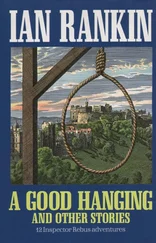She approached the barn from an oblique angle that allowed her a look in the door before she could be seen herself. Mr. Chancey Shortley was adjusting the last milking machine on a large black and white spotted cow near the entrance, squatting at her heels. There was about a half-inch of cigarette adhering to the center of his lower lip. Mrs. Shortley observed it minutely for half a second. “If she seen or heard of you smoking in this barn, she would blow a fuse,” she said.
Mr. Shortley raised a sharply rutted face containing a washout under each cheek and two long crevices eaten down both sides of his blistered mouth. “You gonter be the one to tell her?” he asked.
“She’s got a nose of her own,” Mrs. Shortley said.
Mr. Shortley, without appearing to give the feat any consideration, lifted the cigarette stub with the sharp end of his tongue, drew it into his mouth, closed his lips tightly, rose, stepped out, gave his wife a good round appreciative stare, and spit the smoldering butt into the grass.
“Aw Chancey,” she said, “haw haw,” and she dug a little hole for it with her toe and covered it up. This trick of Mr. Shortley’s was actually his way of making love to her. When he had done his courting, he had not brought a guitar to strum or anything pretty for her to keep, but had sat on her porch steps, not saying a word, imitating a paralyzed man propped up to enjoy a cigarette. When the cigarette got the proper size, he would turn his eyes to her and open his mouth and draw in the butt and then sit there as if he had swallowed it, looking at her with the most loving look anybody could imagine. It nearly drove her wild and every time he did it, she wanted to pull his hat down over his eyes and hug him to death.
“Well,” she said, going into the barn after him, “the Gobblehooks have come and she wants you to meet them, says, ‘Where’s Mr. Shortley?’ and I says, ‘He don’t have time
“Tote up them weights,” Mr. Shortley said, squatting to the cow again.
“You reckon he can drive a tractor when he don’t know English?” she asked. “I don’t think she’s going to get her money’s worth out of them. That boy can talk but he looks delicate. The one can work can’t talk and the one can talk can’t work. She ain’t any better off than if she had more niggers.”
“I rather have a nigger if it was me,” Mr. Shortley said.
“She says it’s ten million more like them, Displaced Persons, she says that there priest can get her all she wants.”
“She better quit messin with that there priest,” Mr. Shortley said.
“He don’t look smart,” Mrs. Shortley said, “kind of foolish.”
“I ain’t going to have the Pope of Rome tell me how to run no dairy,” Mr. Shortley said.
“They ain’t Eye-talians, they’re Poles,” she said. “From Poland where all them bodies were stacked up at. You remember all them bodies?”
“I give them three weeks here,” Mr. Shortley said.
Three weeks later Mrs. McIntyre and Mrs. Shortley drove to the cane bottom to see Mr. Guizac start to operate the silage cutter, a new machine that Mrs. McIntyre had just bought because she said, for the first time, she had somebody who could operate it. Mr. Guizac could drive a tractor, use the rotary hay-baler, the silage cutter, the combine, the letz mill, or any other machine she had on the place. He was an expert mechanic, a carpenter, and a mason. He was thrifty and energetic. Mrs. McIntyre said she figured he would save her twenty dollars a month on repair bills alone. She said getting him was the best day’s work she had ever done in her life. He could work milking machines and he was scrupulously clean. He did not smoke.
She parked her car on the edge of the cane field and they got out. Sulk, the young Negro, was attaching the wagon to the cutter and Mr. Guizac was attaching the cutter to the tractor. He finished first and pushed the colored boy out of the way and attached the wagon to the cutter himself, gesticulating with a bright angry face when he wanted the hammer or the screwdriver. Nothing was done quick enough to suit him. The Negroes made him nervous.
The week before, he had come upon Sulk at the dinner hour, sneaking with a croker sack into the pen where the young turkeys were. He had watched him take a frying-size turkey from the lot and thrust it in the sack and put the sack under his coat. Then he had followed him around the barn, jumped on him, dragged him to Mrs. McIntyre’s back door and had acted out the entire scene for her, while the Negro muttered and grumbled and said God might strike him dead if he had been stealing any turkey, he had only been taking it to put some black shoe polish on its head because it had the sorehead. God might strike him dead if that was not the truth before Jesus. Mrs. McIntyre told him to go put the turkey back and then she was a long time explaining to the Pole that all Negroes would steal. She finally had to call Rudolph and tell him in English and have him tell his father in Polish, and Mr. Guizac had gone off with a startled disappointed face.
Mrs. Shortley stood by hoping there would be trouble with the silage machine but there was none. All of Mr. Guizac’s motions were quick and accurate. He jumped on the tractor like a monkey and maneuvered the big orange cutter into the cane; in a second the silage was spurting in a green jet out of the pipe into the wagon. He went jolting down the row until he disappeared from sight and the noise became remote.
Mrs. McIntyre sighed with pleasure. “At last,” she said, “I’ve got somebody I can depend on. For years I’ve been fooling with sorry people. Sorry people. Poor white trash and niggers,” she muttered. “They’ve drained me dry. Before you all came I had Ringfields and Collins and Jarrells and Perkins and Pinkins and Herrins and God knows what all else and not a one of them left without taking something off this place that didn’t belong to them. Not a one!”
Mrs. Shortley could listen to this with composure because she knew that if Mrs. McIntyre had considered her trash, they couldn’t have talked about trashy people together. Neither of them approved of trash. Mrs. McIntyre continued with the monologue that Mrs. Shortley had heard oftentimes before. “I’ve been running this place for thirty years,” she said, looking with a deep frown out over the field, “and always just barely making it. People think you’re made of money. I have the taxes to pay. I have the insurance to keep up. I have the repair bills. I have the feed bills.” It all gathered up and she stood with her chest lifted and her small hands gripped around her elbows. “Ever since the Judge died,” she said, “I’ve barely been making ends meet and they all take something when they leave. The niggers don’t leave—they stay and steal. A nigger thinks anybody is rich he can steal from and that white trash thinks anybody is rich who can afford to hire people as sorry as they are. And all I’ve got is the dirt under my feet!”
You hire and fire, Mrs. Shortley thought, but she didn’t always say what she thought. She stood by and let Mrs. McIntyre say it all out to the end but this time it didn’t end as usual. “But at last I’m saved!” Mrs. McIntyre said. “One fellow’s misery is the other fellow’s gain. That man there,” and she pointed where the Displaced Person had disappeared, “—he has to work! He wants to work!” She turned to Mrs. Shortley with her bright wrinkled face. “That man is my salvation!” she said.
Mrs. Shortley looked straight ahead as if her vision penetrated the cane and the hill and pierced through to the other side. “I would suspicion salvation got from the devil,” she said in a slow detached way.
“Now what do you mean by that?” Mrs. McIntyre asked, looking at her sharply.
Читать дальше









